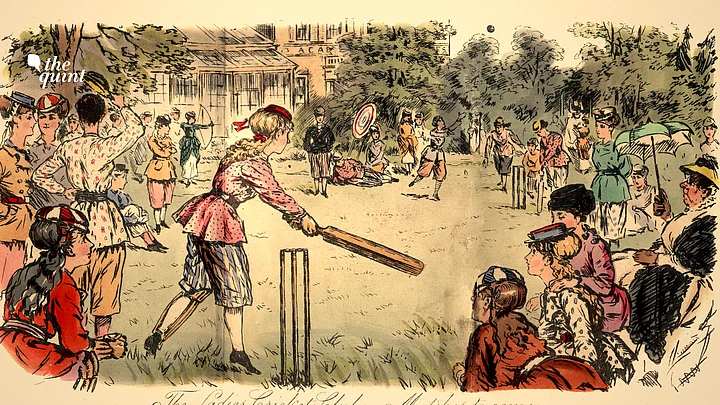In January 2008, when cricketer Harbhajan Singh was accused of calling the Australian all-rounder Andrew Symonds a “monkey”, the Indian team’s defence was that he used the term "Maa ki", variously reported in the press as being part of "teri maa ki" or "maa ki ***", both widely-used sexually abusive epithets in India. Based on this claim, the offence by Harbhajan Singh was downgraded to a lower level.
When someone like Sachin Tendulkar who is known for his composure in the field, someone who has never been known to be abusive, supported this claim, it made the matter even graver. The fact that this was accepted by the ICC investigating team is equally disturbing, as it sends out the signal that racist abuse is unacceptable, but sexist and downright misogynistic abuses are fine.
Not Even Presence Of Family Can Deter Cricketers From Spewing Sexist Slurs
In March 2018, during the infamous Newlands ball-tampering scandal, Candice Warner (David Warner's spouse) blamed herself for the fiasco, for letting herself be disturbed by sexually-charged abuse from the South African spectators, which in turn affected David Warner and influenced him to react in ways that resulted in ball-tampering. Once again, while racial abuse by spectators is mostly taken seriously, gendered sexual abuse is apparently okay, so much so that even women accept it as normal, and are in fact induced to feel guilt for feeling emotionally affected by such abuse.
Sexually-charged words is rarely taken as seriously in sport, and in life, as racially-charged abuse is. WAG ( wives and girlfriends — (itself a sexist media term) — attacks and WAG bullying by so-called ‘fans’ are on the rise, and while some are ejected from stadiums, no serious action has been taken by cricket bodies as yet. This of course raises the larger problem of excessive use of sexual abuse by Australian cricketers on the field. However, this is not unique to Australian cricketers. Indian cricketers frequently use “be**c***” "; “ma**C***”, and drop the F-bomb quite often.
That their families and friends are watching them, does not deter these sportsmen from spewing sexist expletives.
With the expansion of cricket, and the popularity of IPL, more and more cricketers from around India have started mouthing sexist abuses on the field. Millions of people including a large number of children and young adults perceive these cricketers as their role models, and it is strange that cricket players, the BCCI and CoA, coaches and management, and their own families, do not appear to take offense, and do nothing to restrain the players.
“This Does Not Happen In Women’s Cricket”
When the Newlands scandal blew up, Marizanne Kapp, the South African women’s cricket team member tweeted: "this DOES NOT happen in Women's Cricket". Women's cricket, and women's sporting matches in general, are as competitive, fiercely fought, combative, and driven as their male counterparts’ are.
The usual argument is that there is nothing wrong in being ‘aggressive’.
There are many ways to be aggressive, and it is never clear why one has to mouth sexually and racially abusive terms to be aggressive. Great players across the world have done exceedingly well without shooting their mouths off — Tendulkar himself, and MS Dhoni (except when he is berating his own team mates) being great exemplars. The problem is when aggressive behaviour descends to the level of being uncouth —Hardik Pandya's comments on Koffee with Karan being a prime example, and is not at all surprising, considering the widespread culture of mouthing sexually abusive terms on the field by Indian cricketers and their counterparts in many other countries.
Shannon Gabriel's homophobic comment received an apt response from Joe Root (and a suspension from the ICC), but in the past there have been far worse and more crude homophobic remarks that have gone unpunished, and several times even un-rebuked.
Why Does Aggression In Sports Have To Be Expressed Through Sexism?
Why does aggression have to be expressed in sexual, homophobic terms, and targeted at mainly women and marginalised communities? When will our cis-gendered male cricketers start realising that they serve as role models for millions, and that they ought not to send out signals which show racist, misogynist or homophobic behavior as acceptable and even “cool”?
“Boys will be boys” has always been the defence, and the reference to fully grown men as “boys” itself indicates a mentality that allows for adult men to get away with such behaviour.
Another common defence of such behaviour is to say that sledging is fine, so long as we do not "cross the line". Cheating in the form of ball-tampering or in other ways is seen in such statements as “crossing the line”. What they do not seem to realise is that abuse of any nature IS cheating. Sledging, racial, sexual, and homophobic abuse attempts to destabilise the mental state of the opponent, and thus, gives the abuser leverage. How is this not cheating?
It is time cricket and other competitive sports take sexism as seriously as it takes other wrongdoings.
(D Parthasarathy is a Professor, Department of Humanities and Social Sciences, Indian Institute of Technology, Bombay. This is an opinion piece and the views expressed above are the author’s own. The Quint neither endorses, nor is responsible for them.)
